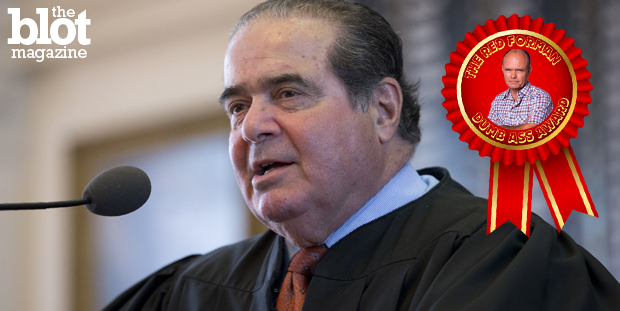Supreme Court Justice Antonin Scalia has won our Red Forman Dumbass Award, a decision catalyzed by his dissenting opinions on federal subsidies for health insurance under Obamacare and on same-sex marriage. This one has been a long time in coming. He is an odious, reactionary bigot who abuses the power of his position for one purpose. He works to ensure that those in positions of power stay there in the name of social stability. That alone is not sufficient to win the Dumbass Award; loads of people who should be removed from positions of responsibility hold those beliefs. No, he wins it for being intellectually dishonest, for thinking the rest of us won’t notice — and being arrogant about it.
For those of you who haven’t watched the late and lamented “That ’70s Show,” Red Forman was a curmudgeonly father and a hard-working Korean War vet who just didn’t understand why his son and his friends behaved foolishly, so he had a term for them: dumbasses.
Let us begin with the King v. Burwell case, that kept the subsidies for health insurance going to those whose state did not set up an exchange. In his dissent, Scalia stated, “This case requires us to decide whether someone who buys insurance on an Exchange established by the Secretary [of Health and Human Services] gets tax credits. You would think the answer would be obvious — so obvious there would hardly be a need for the Supreme Court to hear a case about it.”
Indeed you would if you remember that in the 2012 case [National Federation of Independent Businesses et.al. v. Sebelius, Secretary of Health and Human Services, et. al.,] he wrote, “Without the federal subsidies … the exchanges would not operate as Congress intended and may not operate at all.”
Read more: 50 States of Gay: Supreme Court Overturns Same-Sex Marriage Bans in Historic Ruling
Apparently, Scalia forgot his own opinion, writing in King, “The Court interprets §36B to award tax credits on both federal and state Exchanges. It accepts that the ‘most natural sense’ of the phrase ‘Exchange established by the State’ is an Exchange established by a State. (Understatement, thy name is an opinion on the Affordable Care Act!) Yet the opinion continues, with no semblance of shame, that ‘it is also possible that the phrase refers to all Exchanges—both State and Federal. (Impossible possibility, thy name is an opinion on the Affordable Care Act!)’”
Having stated three years ago that Congress intended to federal subsidies as an integral part of the act needed to make it work, he fails to accept that the second interpretation is valid despite having stated so previously.
And that brings us to the Obergefell v. Hodges case that recognized marriage equality as the law of the land based on the 14th Amendment. Justice Scalia wrote, “When the Fourteenth Amendment was ratified in 1868, every State limited marriage to one man and one woman, and no one doubted the constitutionality of doing so. That resolves these cases.”
Applying this logic, separate-but-equal in Plessy v. Ferguson settled race relations, and Brown v. Board of Education was not only decided incorrectly, but also it should never have been heard by the court.
Elsewhere in Obergefell, Scalia opined, “to allow the policy question of same-sex marriage to be considered and resolved by a select, patrician, highly unrepresentative panel of nine is to violate a principle even more fundamental than no taxation without representation: no social transformation without representation.”
He didn’t seem to object to a 5-4 decision in Citizens United that gave corporations the right to spend as much as they want to buy legislative support for their interests. I suppose what really upset Scalia in the Obergefell case is that now gay corporations can marry. It is hard to imagine that changing the idea of marriage is more radical than declaring that corporations are people, too.
Read more: Other Winners of TheBlot Magazine Red Forman Dumbass Award
Finally, the pompous blowhard wrote, “The opinion is couched in a style that is as pretentious as its content is egotistic.”
Lawyers should never, ever, ever comment on the literary merit of others’ wordsmithing. Among the professionals who rely on the written word for their daily bread, lawyers are the worst. They are worse than advertising and PR people, worse than journalists, worse than novelists, screenwriters, playwrights and poets. Pop quiz: When was the last time you read a legal document if you didn’t have to?
Scalia, like most lawyers, he thinks he can write – and like most lawyers, he can’t. “Understatement, thy name etc.” is not clever, it is not elegant, and it’s snark for snark’s sake. Bullshit by any other name would smell as foul, and vitriol is not the same thing as wit. As the great Truman Capote said of Jack Kerouac’s “On the Road,” “that’s not writing, that’s typing.”
Scalia suggested in King that the reasoning of the court is “pure applesauce.” Perhaps, he was misquoting Will Rogers who said “politics is applesauce.” Rogers has been dead 80 years, but Scalia is so out of tune with the culture that he suggested in Obergefell “one would think that Freedom of Intimacy is abridged rather than expanded by marriage. Ask the nearest hippie.” Hippies were hunted to extinction by punk rockers and goths in the 1980s — and a good thing, too. In King, Scalia also used the term “jigger-pokery,” which probably makes as much sense to today’s Americans as 23-skidoo [Google it]. SCOTUScare? Please.
In the end, Scalia is just an angry little man who can quote Latin but can’t accept this simple adage: mutantur omnia nos et mutamur in illis — all things change and we change with them.
Jeff Myhre is a contributing journalist for TheBlot Magazine.






